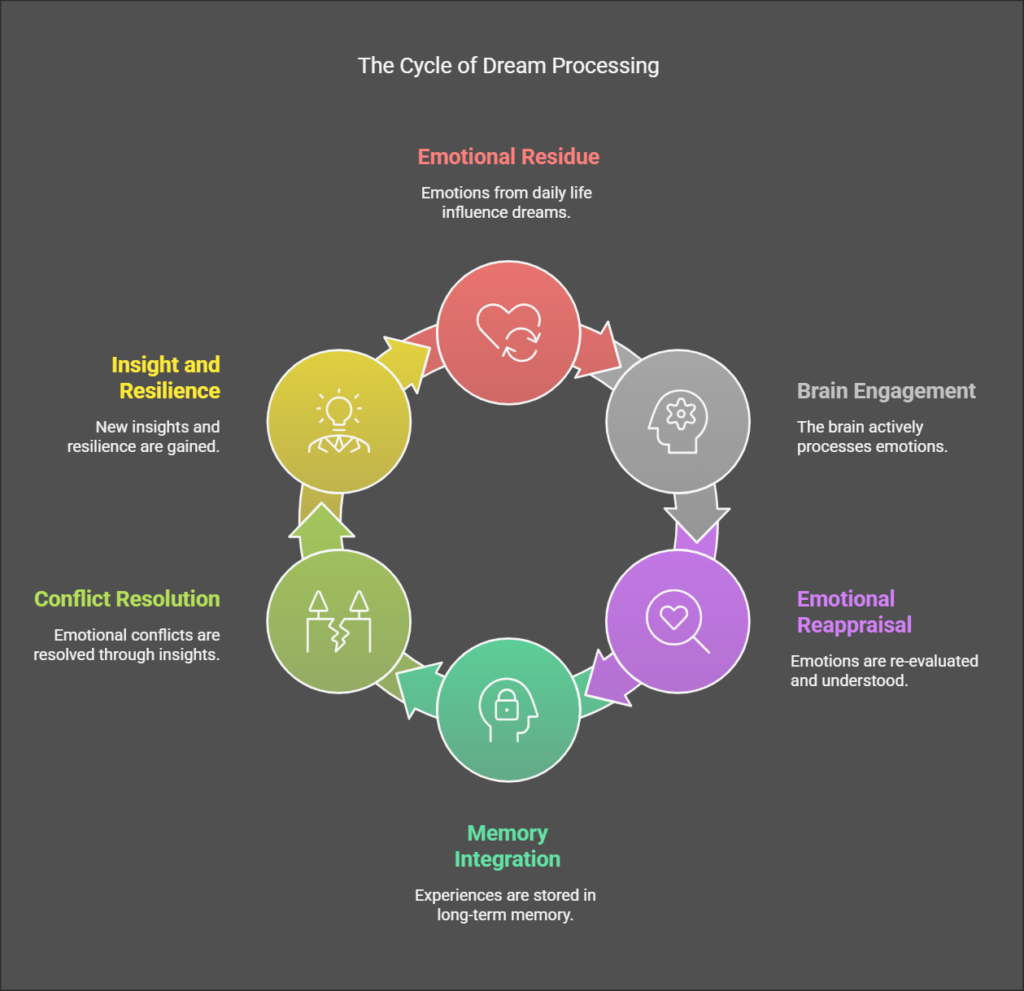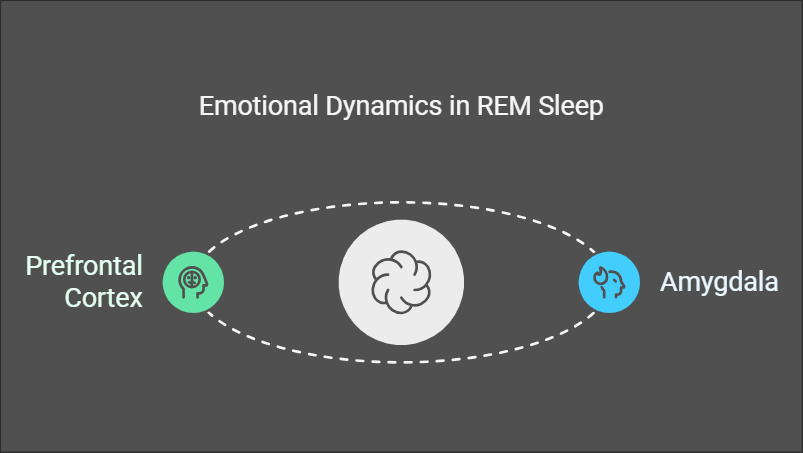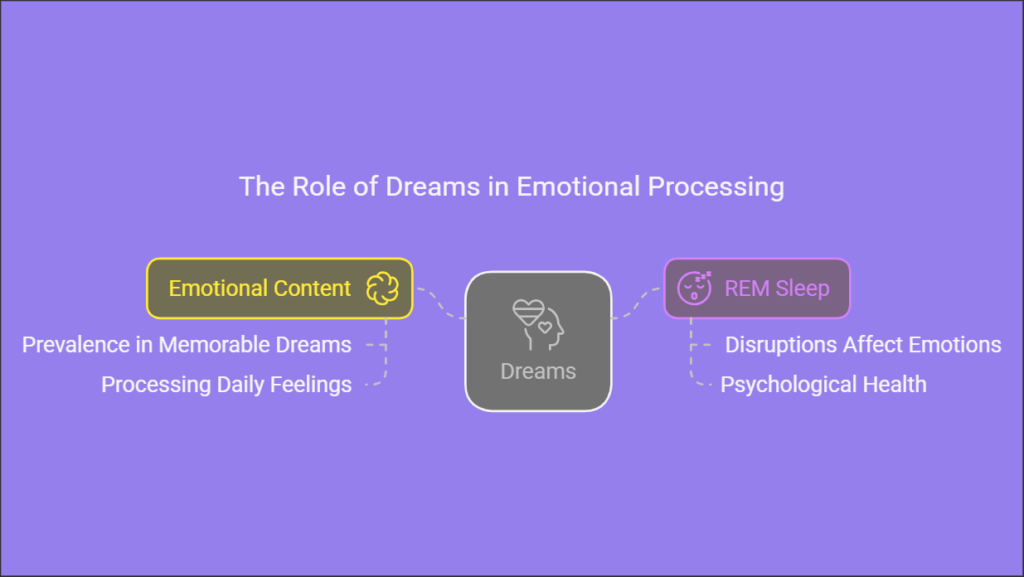Dreams and emotional processing are deeply intertwined aspects of our sleep experience. In our dreams, our brains work to sift through daily events, feelings, and unresolved conflicts, effectively processing emotions that may be too intense or complex to handle while awake.

This nocturnal activity not only influences our emotional well-being but also plays a crucial role in memory consolidation and stress relief.
Key Takeaways
- Emotional Integration: Dreams serve as a natural mechanism for integrating and processing emotions, helping us manage stress and emotional upheaval.
- REM Sleep’s Role: The REM stage of sleep is particularly important for emotional regulation, with vivid dreams often reflecting unresolved feelings.
- Psychological Benefits: Regular dream activity can improve mood, enhance coping strategies, and even stimulate creative problem-solving.
- Statistical Insights: Research shows that over 70% of people feel their dreams help them process emotions, and studies from the [Sleep Foundation] suggest that REM sleep is critical for emotional health.
The Connection Between Dreams and Emotions
Dreams are not random; they are a dynamic, symbolic language of the mind. They often mirror the emotional residue of our daily lives—joy, sorrow, anxiety, or hope.

When we dream, our brain is actively engaged in the process of emotional reappraisal, reprocessing experiences, and integrating them into our long-term memory. This nightly ritual can help us resolve emotional conflicts, gain new insights, and foster resilience.
Why Do We Process Emotions in Dreams?
- Stress Relief: Dreaming allows the mind to release built-up tension by simulating scenarios that help us work through stress.
- Memory Consolidation: By processing emotions during REM sleep, the brain can consolidate memories and contextualize them, which is vital for learning and adaptation.
- Creative Insight: Emotional dreams can offer fresh perspectives, enabling creative problem-solving by reframing how we see our challenges.
The Science Behind Emotional Processing in Sleep
During sleep, especially in the REM stage, our brain regions involved in emotion—such as the amygdala and the prefrontal cortex—engage in active communication.
Neuroimaging studies indicate that the amygdala, which processes fear and pleasure, is highly active during REM sleep, whereas the prefrontal cortex, responsible for rational thought, shows reduced activity. This unique state allows for a safe, uninhibited exploration of our emotions without the constraints of logic or judgment.
Get instant dream insights with our Free Dream Interpretation App

Practical Techniques to Enhance Emotional Processing Through Dreams
1. Dream Journaling
Keeping a dream journal by your bedside can help capture those elusive emotional narratives immediately upon waking. Recording dreams allows you to track recurring themes and emotions, providing valuable insights into unresolved issues.
2. Mindfulness and Meditation
Practicing mindfulness and meditation before bed can increase awareness during dreams, making it easier to recall and analyze the emotions experienced during sleep.
3. Sleep Hygiene
A consistent sleep routine and a conducive sleep environment can promote uninterrupted REM sleep, ensuring that your brain has the opportunity to process emotions effectively throughout the night.
4. Professional Guidance
For those who struggle with intense or recurring negative emotions in their dreams, consulting a therapist or sleep specialist can be beneficial. Professionals can help decode dream symbols and guide you through emotional healing.
Related: Dreams of Defeat
Statistical Insights on Dreams and Emotional Regulation
Recent studies underscore the importance of dreams in emotional processing:
- Prevalence of Emotional Dreams: According to a survey referenced by The Big Dream Survey, nearly 70–80% of individuals report that their most memorable dreams carry significant emotional content that aids in processing their daily feelings.
- REM Sleep and Emotion: Research highlighted by the [Sleep Foundation] reveals that disruptions in REM sleep can lead to difficulties in regulating emotions, underlining the critical role that dreams play in maintaining psychological health.

Final Thoughts
Dreams and emotional processing form an essential part of our mental and emotional well-being. By providing a natural outlet for resolving emotional conflicts and integrating daily experiences, dreams enable us to face life’s challenges with greater resilience and insight.
Embracing and exploring these nocturnal narratives through practices like journaling and mindfulness can unlock hidden pathways to personal growth and healing. Delve into your dreams to discover the rich tapestry of emotions waiting to be understood and transformed.





